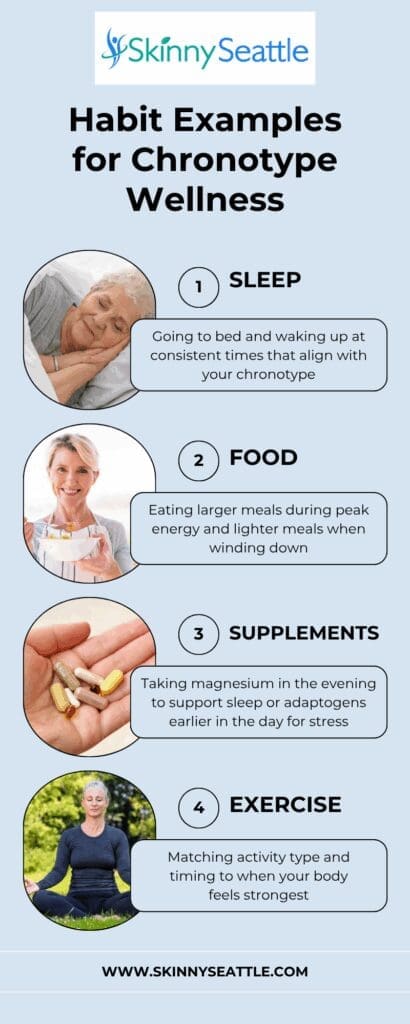
Feeling different as the seasons change? That is normal and fixable. Many midlife women notice shifts in energy, mood, and sleep when summer turns into fall or when long winter months settle in. In the Pacific Northwest, shorter days, rain, and holiday stress can make staying consistent with healthy routines even harder.
At Skinny Seattle, we teach clients how to build a seasonal wellness plan that works with these natural changes instead of fighting them. Adapting your plan does not mean starting over. It means making minor adjustments to food, movement, mindset, and self-care so you feel balanced year-round.
Why Seasons Affect Hormones and Energy
Your body responds to light, temperature, and lifestyle shifts that come with each season. Here are some common changes:
- Light Exposure: Shorter days in fall and winter reduce natural light, lowering vitamin D and impacting melatonin and serotonin.
- Sleep: Darkness can tire you, but poor sleep habits may keep you awake.
- Mood: Seasonal changes can increase stress, anxiety, or sadness, especially in the PNW, where sunlight is limited.
- Hormones: Cortisol, melatonin, and other hormones shift as your circadian rhythm adjusts to less daylight.
Acknowledging these changes helps you create a hormone health winter plan that supports your body instead of overwhelming it.
Food Swaps for Seasonal Wellness
Nutrition is one of the easiest ways to support your body during seasonal shifts. Try these swaps:
- Warm, Comforting Foods: In cooler months, replace cold smoothies with warm soups, stews, and roasted vegetables, which are easier to digest.
- Seasonal Produce: Incorporate squash, root vegetables, apples, and pears, which are naturally abundant in fall and winter.
- Vitamin D Support: Add foods rich in vitamin D, like salmon and eggs, to help offset lower sunlight exposure.
- Balanced Treats: Holiday sweets are part of life. Pair indulgences with protein or fiber to keep blood sugar steady.
These changes help you maintain consistency without feeling deprived.
Movement Ideas for Fall and Winter
Dark mornings, rainy days, and busy schedules often derail exercise routines. Instead of giving up, try adjusting:
- Indoor Movement: When it is too wet to get outside, explore yoga, strength training, or at-home fitness apps.
- Daylight Walks: Use lunchtime breaks for fresh air and natural light exposure.
- Lower Pressure Workouts: Focus on consistency rather than intensity. Shorter, manageable sessions often work better in winter.
- Seasonal Activities: Hiking in crisp fall air or snowshoeing in winter can bring variety and joy.
The goal is not perfection. It is about finding activities that fit your energy and schedule.
Mindset Shifts for Seasonal Health
Changing seasons provide an opportunity to reflect and reset. Here are mindset practices to support your fall health routine:
- Reflection: Use autumn to evaluate what worked during summer and what needs adjusting.
- Stress Management: Anticipate holiday stress and build in calm moments with journaling, deep breathing, or meditation.
- Grace Over Perfection: Remind yourself that some days will look different. Adaptation is success.
- Connection: Shorter days can feel isolating. Intentionally plan time with friends or the community to boost mood.
These mindset shifts help you stay resilient through seasonal transitions.
Coaching and Adaptation, Not Perfection
Lorem ipsum dolor sit amet, consectetur adipiscing elit. Ut elit tellus, luctus nec ullamcorper mattis, pulvinar dapibus leo.

Why the Pacific Northwest Needs Special Consideration
Living in the PNW comes with unique seasonal challenges:
- Limited Sunlight: Many women experience lower vitamin D and mood changes due to long stretches of gray skies.
- Weather Barriers: Rain and shorter days make outdoor exercise harder to maintain.
- Holiday Stress: The end of the year often brings caregiving demands, family obligations, and financial pressure.
Creating an adaptive health plan builds resilience against these common challenges.
Take the Next Step
It may be time for a personalized approach if seasonal changes leave you feeling off balance. Skinny Seattle can help you create a plan that adapts to you.
- Explore more resources on our Blog Hub
- Take the Free Hormone Health Quiz to uncover your seasonal health needs
- Learn more about our Services and book your Seasonal Plan Review
With the proper support, you can move through fall and winter with energy, confidence, and balance.
Frequently Asked Questions
Why do I feel more tired in the fall and winter?
Shorter days and less sunlight reduce vitamin D and melatonin regulation, making you more fatigued. Seasonal routines can help restore energy.
Can hormones really change with the seasons?
Yes. Light and circadian rhythms influence cortisol, melatonin, and serotonin, which explains why energy and mood shift as seasons change.
How often should I adapt my wellness plan?
Most clients benefit from reviewing their routines at least twice a year, adjusting for summer and winter shifts.
Stay Balanced All Year
Seasonal changes do not have to derail your health. With the right plan, you can feel energized, supported, and resilient no matter the weather.
Schedule your Seasonal Plan Review or take the quiz today to start building a routine that flows with the seasons.
Skinny Seattle proudly serves women across Bellevue, Kirkland, Redmond, Sammamish, and the greater Eastside. Let us help you create a seasonal wellness plan that works for real life.
